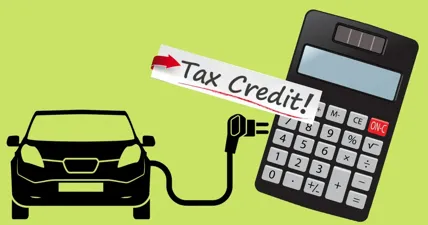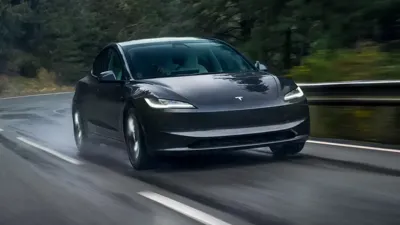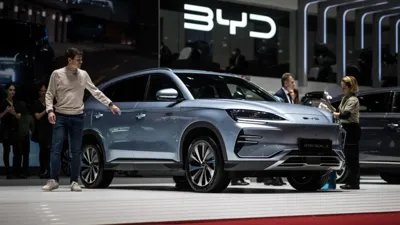By utilizing the EV tax credit policy, you can receive a $7,500 direct deduction on the purchase price of a TESLA, while models X and Y continue to qualify for the full tax credit.Don’t miss out on understanding the deduction policy!
![]()
The IRS has given automakers a little more wiggle room around which electric vehicles will qualify for a federal tax credit worth up to $7,500.The tax credits are a key part of the Biden administration's plan to speed up the shift to electric vehicles and slash carbon emissions from transportation.
For car shoppers, the result can be confusing. We'll do our best to help you navigate it.
What is the electric vehicle tax credit?
The electric vehicle tax credit, also known as the EV tax credit, is a nonrefundable credit meant to lower the cost of qualifying plug-in electric or other “clean” vehicles. The credit is worth between $2,500 and $7,500 for the 2022 tax year and eligibility for claiming the credit depends on the number of electric vehicles sold by the manufacturer, the vehicle’s weight, and if you own the car. The only change made to the credit for tax year 2022 is a new North American final assembly requirement, effective August 17, 2022.
The newly modified credit, now called the clean vehicle credit, has new rules for claiming the credit based on assembly location, income thresholds, and expanded eligibility for the vehicles covered by the credit. These new rules largely take effect in 2023 and last until 2032.
Beginning with tax year 2023, in addition to a new North America final assembly requirement, the former $7,500 credit is broken into two new credits worth up to $3,750 each for qualifying buyers of new all-electric cars, fuel cell vehicles and hybrid plug-ins. One of the new $3,750 credits is available for meeting the critical minerals requirement and the other for purchasing a qualifying vehicle that meets the battery component requirement.
The credit ends December 31, 2032.
How does the clean vehicle credit work?
The clean vehicle tax credit has a number of stipulations you’ll need to meet to qualify for claiming the two-part credit on a fully electric or plug-in-hybrid electric vehicle placed in service after April 17, 2023.
To be considered a qualified clean vehicle, it needs to meet these criteria:
- Have a battery storage capacity of 7 kilowatt-hours (kWh) or more.
- Weigh less than 14,000 pounds in gross vehicle weight.
- Be produced by a qualified manufacturer (fuel-cell vehicles excluded).
- Undergo final assembly in North America.
- Have 50% or more of the value of the battery components manufactured or assembled in North America (required for one of the $3,750 credits).
- Have 40% or more of the value of the minerals contained in its battery mined or processed in countries with which the US has a free trade agreement, or recycled in North America to receive the remaining $3,750 credit.
- Have a manufacturer suggested retail price that doesn't exceed $80,000 for SUVs, pickups, and vans or $55,000 for other vehicles.
To claim the tax credit, you’ll need to meet the following requirements:
- You have to purchase a new car that meets the above criteria for being a qualified clean vehicle. It can’t be leased or purchased used (a lesser amount is available for previously-owned vehicles under a different credit called the used clean vehicle credit).
- You can’t purchase the clean vehicle for resale, meaning you can’t act solely as a middleman when making the purchase of a clean vehicle to claim the tax credit.
- Meet certain income requirements detailed below
- Use the qualifying vehicle primarily in the United States
- The seller or dealer is required to report to both you and the IRS certain information about the vehicle you purchase including:
seller/dealer name and taxpayer ID number
buyer's name and taxpayer ID number
maximum credit allowable under IRC 30D for new vehicles or IRC 25E for previously owned vehicles
vehicle identification number (VIN), unless the vehicle is not assigned one
battery capacity
date of sale
sale price
for new vehicles, verification that the buyer is the original user
Conclusion
Electric Vehicle Tax Credits are financial incentives provided by the government to encourage the purchase of electric vehicles (EVs). These credits can significantly reduce the overall cost of an EV, making it more affordable for consumers. Typically, buyers may receive a direct tax credit on their federal income taxes, which can range from a few thousand dollars to as much as $7,500, depending on the vehicle's battery capacity and eligibility criteria. The goal of these credits is to promote cleaner transportation options, reduce greenhouse gas emissions, and stimulate the growth of the electric vehicle market. Additionally, some states and local governments may offer additional incentives, further enhancing the appeal of EVs for consumers.


